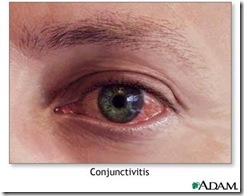Is There Relief From Seasonal Allergy Eyes?
This time of year can be downright miserable for allergy sufferers. Here in East Texas, winter allergens combine with springtime pollens to deliver a double dose of sniffling and sneezing. Most people manage these symptoms with allergy medications. But what about itchy, puffy, watery eyes?

Many allergy sufferers develop allergic conjunctivitis, or “allergy eyes.” There is a vast selection of OTC eye drops that provide temporary relief from itchiness and redness. However, most of those drops contain antihistamines that dry your eyes, reducing the essential tear film that flushes away allergens. Prescription eye drops work differently. And now there’s a newly approved prescription eye drop formula that makes it easier for contact lens wearers to treat their seasonal allergy eyes.
Occasional eye discomfort due to allergies is usually not serious. Be advised, though, that long-term exposure to ocular allergens can result in permanent changes to the inner eyelid. Over time, the inner lid may develop inflammation resembling tiny cobblestones. Allergy sufferers who wear contact lenses are at higher risk of developing this uncomfortable condition, called Giant Papillary Conjunctivitis (GPC), and should therefore pay close attention to their lens care schedule or, in some cases, not wear contact lenses at all when allergens are prevalent.
There are a couple of highly effective prescription eye drops that I prescribe to patients: Pataday and recently approved Lastacaft. Both reduce histamine at the cellular level of the eye tissue while preserving proper lubrication and tear production to help fend off allergens. What I like about Lastacaft is that it’s convenient for contact lens wearers: They simply instill one drop five minutes before putting on their lenses, and the medication is effective all day. This way, they don’t need to keep taking out their lenses throughout the day, as they would with OTC and other allergy medications.
If you think you may be suffering from allergic conjunctivitis, consult your optometrist to decide which treatment is right for you and to rule out serious conditions, such as infection, that can cause similar symptoms.
Dr. Jeff Pinkerton
I care for you.
Comments are closed.

Dr. Pinkerton,
What are you thoughts on Elestat (epinastine) ?
Thanks,
Trevor
My first comment was truncated —
Specifically, how is Alcaftadine clinically superior to Epinastine?
Or is Alcaftadine just Allergan’s new kid on the block?
I prescribe both and determine the best choice on a case-by-case basis. Generally, I like Pataday for the convenience and Elestat for severer cases (perhaps with a secondary medicine). Thanks for commenting, and please excuse the delayed reply as comments had been going to the wrong email address for approval/response. – Dr. P